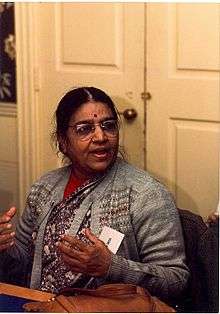Neera Desai
| Neera Desai | |
|---|---|
 Neera Desai | |
| Born | 1925 |
| Died |
June 25, 2009 (aged 84) Mumbai,India |
| Nationality | India |
| Occupation | Academic |
| Known for |
Women's Studies frontrunner, academician, social activist. |
Neera Desai (1925 — 25 June 2009) was one of the leaders of Women's Studies in India and was noted for her contributions as a professor, researcher, academician, political activist and social worker.[1] She founded the first of its kind Research Centre for Women’s Studies and the Centre for Rural Development in 1974. She joined the SNDT Women's University in 1954 and was a part of various governing bodies as a professor and Head of Department of Sociology (post-graduate).[2]
Early life
Desai was born in 1925 (date unknown) to a liberal and educated Gujarati family that was involved in and supported the Indian Independence Movement. Desai herself joined the freedom movement at an early age as a schoolgirl when she became a part of the Vanar Sena (Monkey Brigade) founded by Indira Gandhi which helped the underground circulation of political messages and banned publications.[3] Neera did her primary education at the Fellowship School, a co-educational institution which was founded on Theosophist ideology. She joined Elphinstone College in 1942, but soon gave up formal education to take part in the freedom movement post Mahatma Gandhi's initiation of the Quit India Resolution. Neera married Akshaya Ramanlal Desai, a fellow sociologist, in 1947. [4] Eventually completing her studies, Desai concluded her postgraduate studies shortly post Indian independence. Her M.A. thesis focused on Women in Modern India (analysis of women in the Bhakti Movement) which was later published in 1957. [5]
Professional timeline
Desai had a long career of many landmark achievements. Her professional works focused on improving gender studies, bringing in practical experience into academic life through many policy recommendations, harboring and propagating an understanding of the links of the civil society and educational curriculum. Listed below is short and by no way complete timeline of some of the positions she held during her career. [6]
- 1954 - joined SNDT
- 1965 - Completed her PhD in Sociology
- 1972 - Appointed as a member of the Social Task Force of the Committee on the Status of Women in India
- 1975 - Founded the Research Unit for Women’s Studies
- 1982 - Was one of the founding members of Indian Association for Women’s Studies (IAWS)
- 1987 - Became a member of the National Commission on Self Employed Women and Women in the Informal Sector
- 1988 - Became one of the founding members of SPARROW (Sound and Picture Archives for Research on Women)
Notable works
Desai has written extensively in both English and Gujrati at the intersection of sociology, history and women's studies.[4] Some of her major works are listed below:
- Neera Desai, Woman in Modern India (1957; repr. Bombay: Vora & Co, 1977)
- Neera Desai, The Making of a Feminist, Indian Journal of Gender Studies 2 (1995)
- Neera Desai, Traversing through Gendered Spaces: Insights from Women’s Narratives, in Sujata Patel and Krishna Raj (eds), Thinking Social Science in India: Essays in Honour of Alice Thorner (New Delhi: Sage, 2002). Another version was published in Gujarati in 1997.
- N. Desai and S. Gogate, ‘Teaching of Sociology through the Regional Language’
- Neera Desai, Women and the Bhakti Movement, in Kumkum Sangari and Sudesh Vaid (eds), Women and Culture (Bombay: Research Centre for Women’s Studies, SNDT Women’s University, 1994).
References
- ↑ "IAWS". www.iaws.org.
- ↑ "Neera Desai (1925-2009): Pioneer of Women's Studies in India". Economic and Political Weekly. 50 (23). 5 June 2015.
- ↑ "Indira Gandhi: Biography, Family, Early days in Politics, Criticisms & Awards". www.mapsofindia.com.
- 1 2 Forbes, Geraldine; Thakkar, Usha (1 August 2005). "Foremothers: Neera Desai (b. 1925)". Gender & History. 17 (2): 492–501. doi:10.1111/j.0953-5233.2006.00390.x. ISSN 1468-0424.
- ↑ "Indian Association for Women's Studies (IAWS) • Special Issue • December 2009, Volume II, No.5".
- ↑ "IAWS". www.iaws.org. Retrieved 27 November 2016.